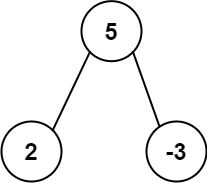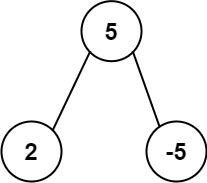给你一个二叉树的根结点 root ,请返回出现次数最多的子树元素和。如果有多个元素出现的次数相同,返回所有出现次数最多的子树元素和(不限顺序)。
一个结点的 「子树元素和」 定义为以该结点为根的二叉树上所有结点的元素之和(包括结点本身)。
示例 1:
输入: root = [5,2,-3] 输出: [2,-3,4]
示例 2:
输入: root = [5,2,-5] 输出: [2]
提示:
- 节点数在
[1, 104]范围内 -105 <= Node.val <= 105
后序遍历获取每个子树元素和,同时用哈希表记录每个子树元素和出现的次数,以及最大的次数 mx。最后判断哈希表中出现次数为 mx 的,获取对应的子树元素,组成结果列表 ans。
# Definition for a binary tree node.
# class TreeNode:
# def __init__(self, val=0, left=None, right=None):
# self.val = val
# self.left = left
# self.right = right
class Solution:
def findFrequentTreeSum(self, root: TreeNode) -> List[int]:
def dfs(root):
if root is None:
return 0
left, right = dfs(root.left), dfs(root.right)
s = root.val + left + right
counter[s] += 1
return s
counter = Counter()
dfs(root)
mx = max(counter.values())
return [k for k, v in counter.items() if v == mx]/**
* Definition for a binary tree node.
* public class TreeNode {
* int val;
* TreeNode left;
* TreeNode right;
* TreeNode() {}
* TreeNode(int val) { this.val = val; }
* TreeNode(int val, TreeNode left, TreeNode right) {
* this.val = val;
* this.left = left;
* this.right = right;
* }
* }
*/
class Solution {
private Map<Integer, Integer> counter;
private int mx;
public int[] findFrequentTreeSum(TreeNode root) {
counter = new HashMap<>();
mx = Integer.MIN_VALUE;
dfs(root);
List<Integer> res = new ArrayList<>();
for (Map.Entry<Integer, Integer> entry : counter.entrySet()) {
if (entry.getValue() == mx) {
res.add(entry.getKey());
}
}
int[] ans = new int[res.size()];
for (int i = 0; i < res.size(); ++i) {
ans[i] = res.get(i);
}
return ans;
}
private int dfs(TreeNode root) {
if (root == null) {
return 0;
}
int s = root.val + dfs(root.left) + dfs(root.right);
counter.put(s, counter.getOrDefault(s, 0) + 1);
mx = Math.max(mx, counter.get(s));
return s;
}
}/**
* Definition for a binary tree node.
* struct TreeNode {
* int val;
* TreeNode *left;
* TreeNode *right;
* TreeNode() : val(0), left(nullptr), right(nullptr) {}
* TreeNode(int x) : val(x), left(nullptr), right(nullptr) {}
* TreeNode(int x, TreeNode *left, TreeNode *right) : val(x), left(left), right(right) {}
* };
*/
class Solution {
public:
unordered_map<int, int> counter;
int mx = 0;
vector<int> findFrequentTreeSum(TreeNode* root) {
mx = INT_MIN;
dfs(root);
vector<int> ans;
for (auto& entry : counter)
if (entry.second == mx)
ans.push_back(entry.first);
return ans;
}
int dfs(TreeNode* root) {
if (!root) return 0;
int s = root->val + dfs(root->left) + dfs(root->right);
++counter[s];
mx = max(mx, counter[s]);
return s;
}
};/**
* Definition for a binary tree node.
* type TreeNode struct {
* Val int
* Left *TreeNode
* Right *TreeNode
* }
*/
func findFrequentTreeSum(root *TreeNode) []int {
counter := make(map[int]int)
mx := 0
var dfs func(root *TreeNode) int
dfs = func(root *TreeNode) int {
if root == nil {
return 0
}
s := root.Val + dfs(root.Left) + dfs(root.Right)
counter[s]++
if mx < counter[s] {
mx = counter[s]
}
return s
}
dfs(root)
var ans []int
for k, v := range counter {
if v == mx {
ans = append(ans, k)
}
}
return ans
}/**
* Definition for a binary tree node.
* class TreeNode {
* val: number
* left: TreeNode | null
* right: TreeNode | null
* constructor(val?: number, left?: TreeNode | null, right?: TreeNode | null) {
* this.val = (val===undefined ? 0 : val)
* this.left = (left===undefined ? null : left)
* this.right = (right===undefined ? null : right)
* }
* }
*/
function findFrequentTreeSum(root: TreeNode | null): number[] {
const map = new Map<number, number>();
let max = 0;
const dfs = (root: TreeNode | null) => {
if (root == null) {
return 0;
}
const { val, left, right } = root;
const sum = val + dfs(left) + dfs(right);
map.set(sum, (map.get(sum) ?? 0) + 1);
max = Math.max(max, map.get(sum));
return sum;
};
dfs(root);
const res = [];
for (const [k, v] of map) {
if (v === max) {
res.push(k);
}
}
return res;
}// Definition for a binary tree node.
// #[derive(Debug, PartialEq, Eq)]
// pub struct TreeNode {
// pub val: i32,
// pub left: Option<Rc<RefCell<TreeNode>>>,
// pub right: Option<Rc<RefCell<TreeNode>>>,
// }
//
// impl TreeNode {
// #[inline]
// pub fn new(val: i32) -> Self {
// TreeNode {
// val,
// left: None,
// right: None
// }
// }
// }
use std::rc::Rc;
use std::cell::RefCell;
use std::collections::HashMap;
impl Solution {
fn dfs(
root: &Option<Rc<RefCell<TreeNode>>>,
map: &mut HashMap<i32, i32>,
max: &mut i32,
) -> i32 {
if root.is_none() {
return 0;
}
let node = root.as_ref().unwrap().borrow();
let sum = node.val + Self::dfs(&node.left, map, max) + Self::dfs(&node.right, map, max);
map.insert(sum, map.get(&sum).unwrap_or(&0) + 1);
*max = (*max).max(map[&sum]);
sum
}
pub fn find_frequent_tree_sum(root: Option<Rc<RefCell<TreeNode>>>) -> Vec<i32> {
let mut map = HashMap::new();
let mut max = 0;
let mut res = Vec::new();
Self::dfs(&root, &mut map, &mut max);
for (k, v) in map.into_iter() {
if v == max {
res.push(k);
}
}
res
}
}

